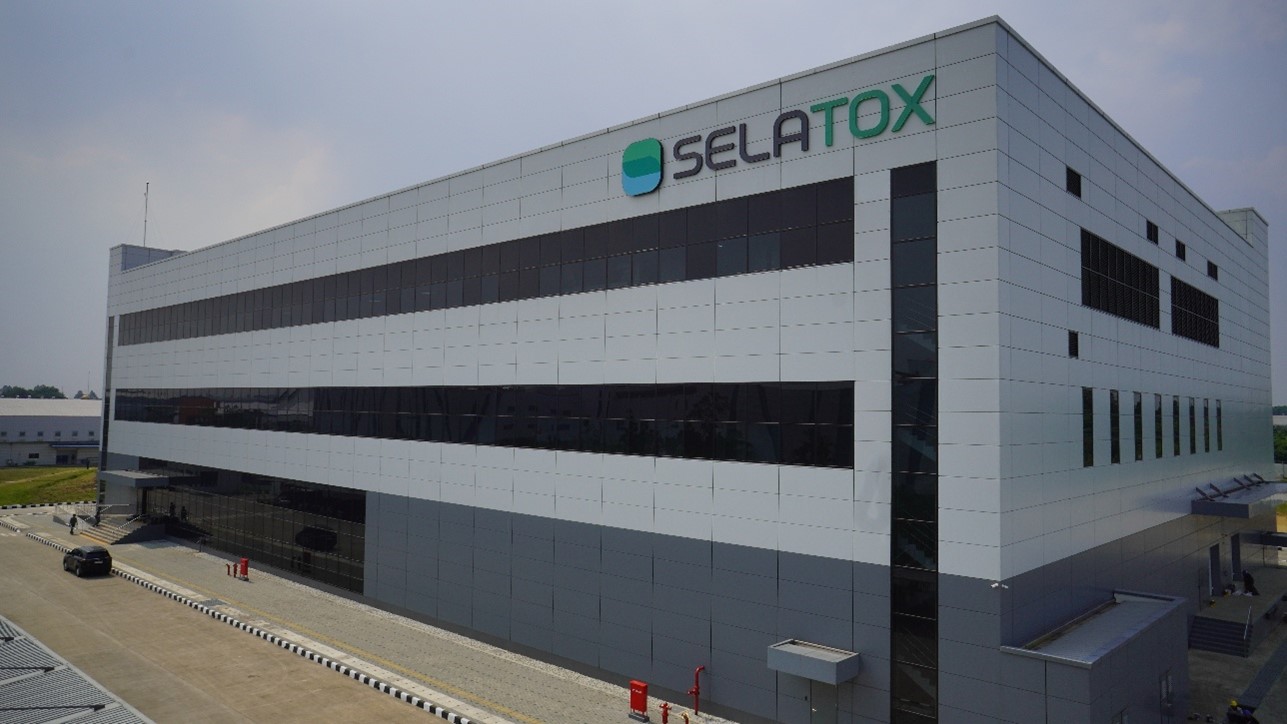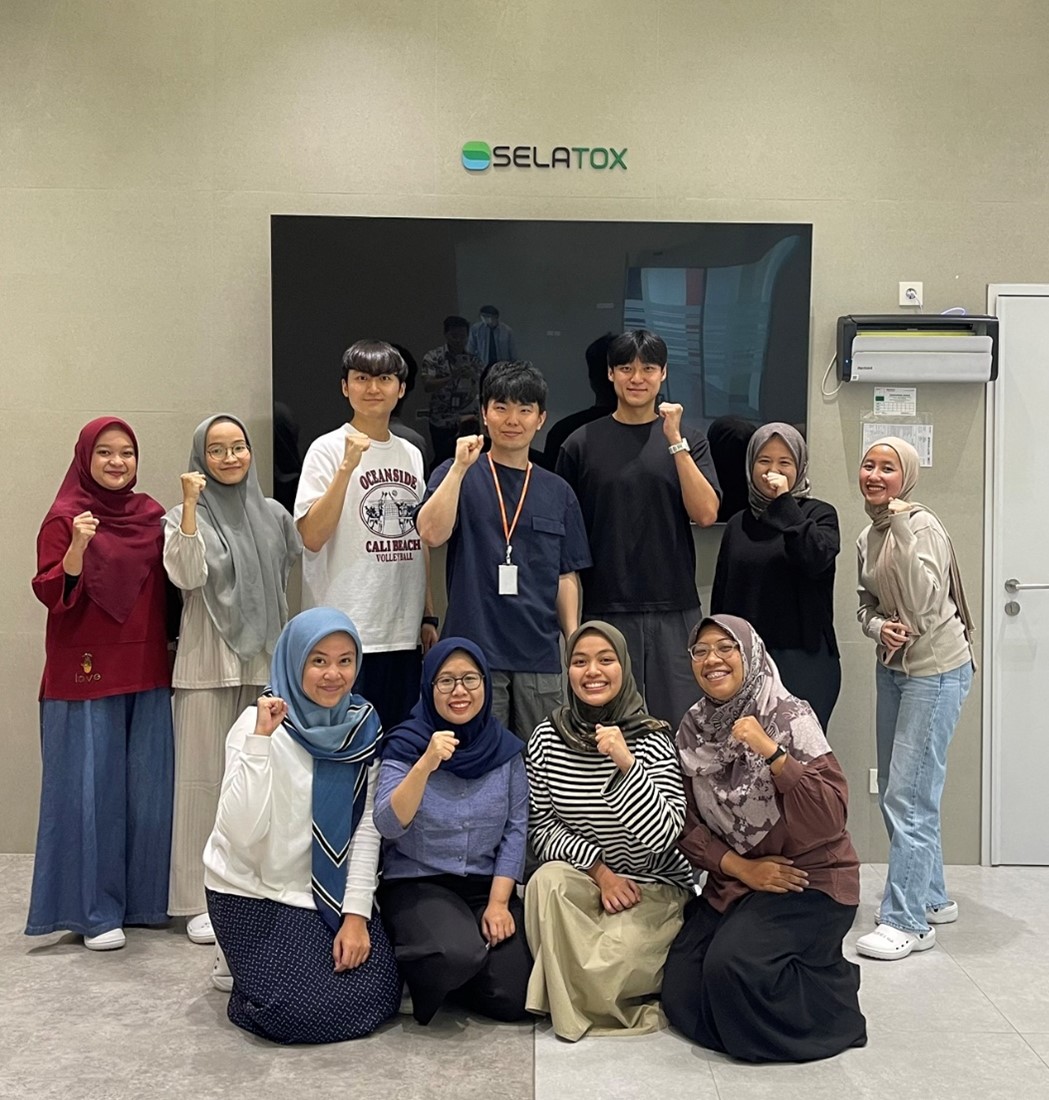
Starting her career in Korea at a pharmaceutical facility that passed global regulatory inspections, she worked in Quality Control (QC) before transitioning to Quality Assurance (QA) as part of the Selatox project — Indonesia’s first toxin production plant — in which she directly participated.
Through intensive learning, she internalized the rigorous standards of sterile manufacturing, and actively shaped her development path within Daewoong’s CDP system and feedback-driven culture.
She says, “Seeing how Daewoong doesn’t simply acquire factories, but builds them from the ground up, made me truly appreciate the company’s long-term vision — and I’m grateful to have started my career here.”
Now, meet Nubla — a young practitioners building the future of Indonesia’s pharmaceutical industry.
Q&A
Q1. Hello! Could you briefly introduce yourself and share what led you to join Daewoong?
Hello! I joined Daewoong in 2023 as part of the first cohort of Global Talents and currently work in the Selatox QA team in Indonesia.
I majored in Bioprocess Engineering in university, and after graduation, while considering a career in the pharmaceutical industry, I learned about Daewoong’s Global Talent Program and decided to apply.
Daewoong’s Global Talent Program is more than just a recruitment initiative — it’s a comprehensive ‘All-Care’ program designed to support every aspect of a new employee’s early journey. From housing arrangements and bank account setup to SIM card activation, onboarding assistance, and a thoughtfully curated welcome kit, every detail is prepared from day one to ensure a smooth and seamless transition.
Although my major wasn't specifically focused on pharmaceutical production, courses on drug release control and an internship at a pharmaceutical company sparked my interest in the field.
What impressed me most was Daewoong’s commitment to R&D and talent development — not only in Korea but also in collaboration with leading universities in Indonesia. It made me even more eager to become part of a global pharmaceutical company.
.jpg)
What impressed me especially after joining the company was Daewoong’s approach — rather than simply buying factories, they build them from the ground up and operate them together with local teams.
I’ve gained valuable insights into the company’s philosophy and feel proud to be involved from the very beginning of this facility’s journey.
Q2. How was your first experience working in Korea?
From pharmaceutical analysis to quality improvement projects, the two years I spent at the Osong plant in Korea were a deeply immersive and rewarding time that allowed me to grow quickly as a pharmaceutical quality specialist.
From April 2023, I worked for about two years in the Quality Control (QC) team at Daewoong’s Osong plant in Korea. The QC team is responsible for analyzing and verifying that pharmaceutical products are safe, effective, and meet the required quality standards.
I began by learning to use basic analytical instruments such as UV-Vis (Ultraviolet-Visible Spectrophotometer) and FT-IR (Fourier-Transform Infrared Spectrometer). These tools are used to verify and identify the drug’s ingredients.
Over time, I advanced to handling more sophisticated equipment such as HPLC (High-Performance Liquid Chromatography) and GC (Gas Chromatography). These instruments are crucial in detecting impurities, measuring component concentrations, and analyzing residual solvents—essential to ensuring drug safety and efficacy.
As part of the Global Talent Program, each participant was assigned a project to improve some aspect of team operations. My project focused on resolving a “ghost peak” issue that occurred during dissolution testing.
Dissolution testing simulates how a drug dissolves and is absorbed in the body. Occasionally, anomalous signals—referred to as ghost peaks—may appear. This issue is often caused by inadequate cleaning of the testing vessels.
To address this, I conducted experiments to validate the adequacy of the cleaning process and introduced improvements to prevent the issue from recurring.
This experience greatly enhanced my skills in problem-solving, experimental design, and communication and collaboration as a quality control professional.
Q3. Did you face any difficulties adjusting to life in Korea?
At first, I was worried because everything was unfamiliar, but Daewoong provided full support to help Global Talent members focus solely on their work.
The company took care of everything—from housing and meals to setting up a mobile SIM card, opening a bank account, and handling administrative procedures upon arrival in Korea. Thanks to that, even as a foreign employee, I was able to adapt without major difficulties.
Daewoong also gave us access to online Korean language learning programs outside of work hours. I personally took more than four classes through the platform and even challenged myself to take the TOPIK II exam.
Thanks to such thoughtful support, I was able to fully concentrate on work and learning without the burden of adjusting to daily life—and I believe that helped me grow much faster.
.jpeg)
About a year and a half into my time at Daewoong, I was looking for a new challenge when I heard that Selatox — Indonesia’s first toxin factory — was forming a new QA team.
QA stands for “Quality Assurance,” plays a critical role in ensuring that the production system operates consistently and safely in full compliance with standards from start to finish.
For example, QA involves validating whether equipment and systems used in the factory operate according to regulations, and ensuring that all records and documentation are accurately maintained in compliance with GMP (Good Manufacturing Practice) standards.
Selatox in particular follows an aseptic process — meaning all products must be manufactured in an environment completely free from microbial or particulate contamination.
This process is essential for injectable drugs and biopharmaceuticals that are delivered directly into the body. Because even the slightest contamination could lead to the disposal of an entire batch, precise quality control and strong system validation capabilities are absolutely critical.

Currently, I work in the Selatox QA team, handling tasks such as device validation, GMP documentation management, and Computer System Validation (CSV). CSV involves verifying that computer systems used to record production and quality data are functioning correctly and operating securely, without risk of data manipulation or loss.
In this role, I face daily challenges such as learning and applying the required standards for adopting new systems and equipment.
Thanks to my background in QC, I have a solid understanding of the flow of drug production and testing. Now, working in QA, I’m expanding my perspective and growing by overseeing the broader quality system as a whole.
Q4. What aspect of Daewoong’s corporate culture impressed you the most?
I truly value Daewoong’s Career Development Program (CDP) and its culture of autonomous learning and growth.
The CDP is a talent development system that allows employees to explore different roles based on their competencies and interests, while also helping them plan their long-term career paths. Rather than simply repeating assigned tasks, employees are encouraged to take initiative, seek new challenges, and shape the direction of their own development — a major strength of the program.
Thanks to this program, I was able to participate in building Indonesia’s first toxin manufacturing plant, which is why I feel especially attached to this system.
One example is the monthly feedback session, which is less about performance evaluation and more like a coaching conversation to help check whether I'm on the right track. Also, Daewoong’s unlimited learning support — allowing access to training whenever needed — has been a strong foundation for someone like me who wants to take on new challenges in unfamiliar fields.
Q5. What are your future goals?
My first goal is to establish stable and reliable quality standards for the aseptic production environment in my current role on the Selatox QA team.
There’s still a lot I need to learn and improve on, but I believe I can grow further by working alongside great mentors.
In the long run, I hope to contribute to raising the technical standards of Indonesia’s pharmaceutical and biopharmaceutical industries, using the knowledge and experience I’ve gained in Korea.
And one day, I’d like to become a stepping stone for others — just like the people who supported and guided me in my own journey.